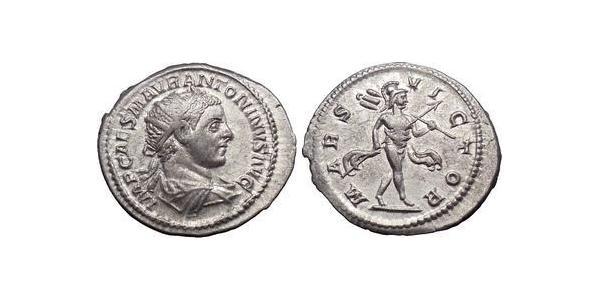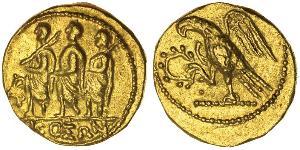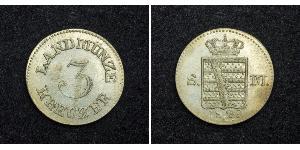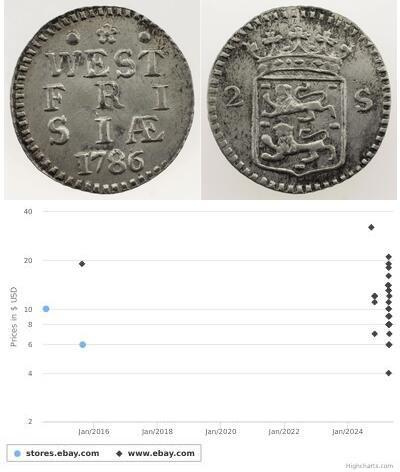[ 3382] Elagabalus, 218-222 A.D. Silver Antoninianus (24mm (4.23 gm.), Rome, 218-219 A.D. Perfect FDC Reference: RIC 122e, S 7491, C 112 IMP CAES MAVR ANTONINVS AVG - Radiate, draped bust right. MARS VICTOR - Mars advancing right, holding spear and trophy. Provided with certificate of authenticity. CERTIFIED AUTHENTIC by Sergey Nechayev, PhD - Numismatic Expert Mars was the Roman god of war, the son of Juno and Jupiter, husband of Bellona, and the lover of Venus. He was the most prominent of the military gods that were worshipped by the Roman legions. The martial Romans considered him second in importance only to Jupiter (their main god). His festivals were held in March (named for him) and October. As the word Mars has no Indo-European derivation, it is most likely the Latinised form of the agricultural Etruscan god Maris. Initially Mars was a Roman god of fertility and vegetation and a protector of cattle, fields and boundaries and farmers. In the second century BC, the conservative Cato the Elder advised "For your cattle, for them to be healthy, make this sacrifice to Mars Silvanus you must make this sacrifice each year". Mars later became associated with battle as the growing Roman Empire began to expand, and he came to be identified with the Greek god Ares. Unlike his Greek counterpart, Mars was generally revered and rivaled Jupiter as the most honoured god. He was also the tutelary god of the city of Rome. As he was regarded as the legendary father of Rome's founder, Romulus, it was believed that all Romans were descendants of Mars. Elagabalus (pronounced El-uh-GAB-uh-lus, c. 203 – March 11, 222), also known as Heliogabalus or Marcus Aurelius Antoninus, was a Roman Emperor of the Severan dynasty who reigned from 218 to 222. Born Varius Avitus Bassianus, he was Syrian on his mother's side, the son of Julia Soaemias and Sextus Varius Marcellus, and in his early youth he served as a priest of the god El-Gabal at his hometown, Emesa. Upon becoming emperor he took the name Marcus Aurelius Antoninus Augustus, and was called Elagabalus only a long time after his death. In 217, the emperor Caracalla was murdered and replaced by his Praetorian prefect, Marcus Opellius Macrinus. Caracalla's maternal aunt, Julia Maesa, successfully instigated a revolt among the Third Legion to have her eldest grandson, Elagabalus, declared as emperor in his place. Macrinus was defeated on June 8, 218, at the Battle of Antioch, upon which Elagabalus, barely fourteen years old, ascended to the imperial power and began a reign that was marred by infamous controversies, to put it mildly. During his rule, Elagabalus showed a disregard for Roman religious traditions and sexual taboos. He was married as many as five times and is reported to have prostituted himself in the imperial palace. Elagabalus replaced Jupiter, head of the Roman pantheon, with a new god, Deus Sol Invictus, and forced leading members of Rome's government to participate in religious rites celebrating this deity, which he personally led. Amidst growing opposition, Elagabalus, only 18 years old, was assassinated and replaced by his cousin Alexander Severus on March 11, 222, in a plot formed by his grandmother, Julia Maesa, and members of the Praetorian Guard. Elagabalus developed a reputation among his contemporaries for eccentricity, decadence, and zealotry which was likely exaggerated by his successors and political rivals. This propaganda was passed on and, as a result, he was one of the most reviled Roman emperors to early historians. For example, Edward Gibbon wrote that Elagabalus "abandoned himself to the grossest pleasures and ungoverned fury." "The name Elagabalus is branded in history above all others" because of his "unspeakably disgusting life," wrote B.G. Niebuhr. Payment & Shipping: Will accept payments via PayPal. = MM_contentVersion;
}
else if (navigator.userAgent && navigator.userAgent.indexOf("MSIE")>=0 & ...
type to read more

|
Posted by:
anonymous 2015-08-19 |
Similar Coin Groups
2025-05-25
- New coin is added to 5 Cent Netherlands
5 Cent Netherlands
group has 11 coins / 8 prices
⇑
Netherlands - 5 Cents 1908 - Wilhelmina
2025-05-24
- Historical Coin Prices
You may be interested in ...






















